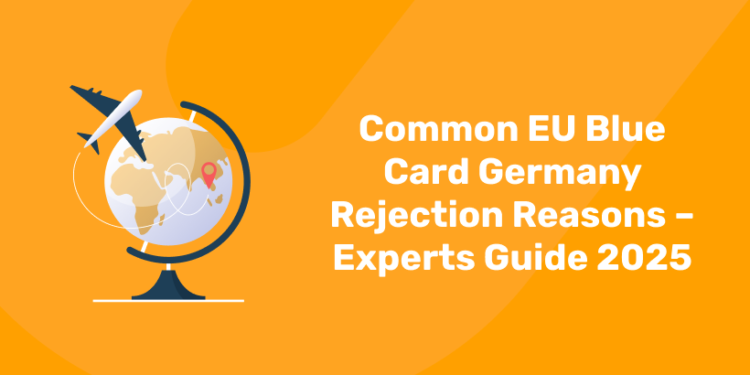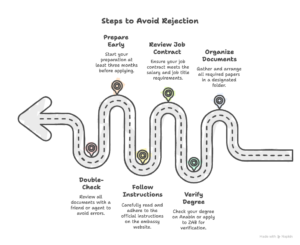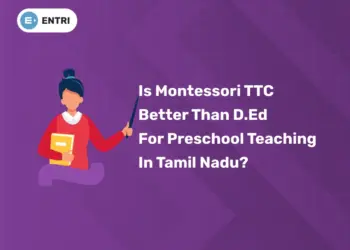Table of Contents
Introduction
The EU Blue Card Germany is the best work permit for skilled non-EU professionals who want to work and live in Germany, but thousands of applications get rejected every year because of simple mistakes that anyone can avoid. You must know the common EU Blue Card Germany rejection reasons before you start your application, because one small error can delay your move by six months or more, and you lose your job offer, money, and time.
This 2025 experts guide explains every major reason why applications fail, from missing documents to criminal records, and we show you exactly how to fix each problem with clear steps. When you prepare carefully and check everything twice, your approval chance goes above 90%. You check your degree on Anabin, confirm the salary with your company, collect all papers in a folder, and learn B1 German with Entri to make your life in Germany smooth and safe from day one.
Ready to take your German language skills to the next level? Get Free Demo Classes Here!
Incomplete or Incorrect Documents
Most EU Blue Card Germany rejection cases happen because of incomplete or incorrect documents, and the embassy or immigration office checks every single paper with strict rules. If one document is missing or wrong, they send your file back immediately. The passport must be valid for at least one year from the application date, so you renew it first if it expires soon. Your degree must be recognized in Germany, and you check Anabin database for green H+ status, but if your college shows no H+ or red, you send papers to ZAB office for ₹5,000 and wait three months for the equal letter.
The employment contract must have both signatures, clear salary amount, job title, start date, and end date, so you scan it as a clear PDF with no blur. You need proof of health insurance that covers Germany, and you buy Indian travel insurance for ₹5,000 per month or German private insurance before you apply. All mark sheets, notary copies, and CV in English must be complete, and you keep three sets of everything.
|
German A2 Exercises – Download Free PDF |
||
Salary Below Threshold
1: How do you say "Good Morning" in German?
Salary is a strict requirement for the EU Blue Card, and if your pay is below the threshold, the office automatically rejects your application without reviewing any other documents. For normal jobs like sales manager or HR head, you need €58,400 per year, which is about ₹48 lakh gross before tax. For shortage occupations like IT developer, data analyst, nurse, civil engineer, or doctor, the minimum is €45,552 per year, which is about ₹37 lakh gross. The salary must be written clearly in the contract, and if your company offers ₹40 lakh for an IT job, you ask HR to change it to ₹46 lakh and sign a new contract. You show bank statements or offer letter if they ask for extra proof, and you never round down the number because even one euro less means rejection.
Free German A1 Mock Tests – Powered by AI!
Test your skills on our interactive platform. Get instant feedback from our AI to help you communicate better and track your progress. Start your free German mock test now.
Test Your German A1 for FreeJob Offer Not Relevant to Qualification
Your job must match your degree, and if the role does not relate to your study, the office says no even with high pay. For example, if you have B.Tech in computer science but the job is English teacher, they reject it, but if you have civil engineering and the job is project manager in construction, it is fine. Shortage occupations give some flexibility, so mechanical engineer can take car company quality role. The employer must be a real German company with website, LinkedIn page, and good reviews on Glassdoor, because fake firms or unauthorized agents cause instant rejection. You check the company on Handelsregister or ask for Impressum on their site to confirm they are legal.
Missing or Incorrect Application Forms
The application form is the main paper, and if you use the wrong form or leave sections blank, your file goes to the reject pile. When you apply from India, you download the embassy form from VFS Global site and fill every box slowly with black pen or online. If you apply inside Germany at Ausländerbehörde, you use their local form which is different. Both you and your employer must sign the form in blue ink, and you cannot leave any part empty even if it says not applicable, so you write N/A. You attach the form on top of your document folder, and you print two copies in case one gets lost.
|
Goethe 2025 Exam Dates: Multiple Test Centers |
|
| Trivandrum Goethe Exam Dates | Kochi Goethe Exam Dates |
| Chennai Goethe Exam Dates | Coimbatore Goethe Exam Dates |
Criminal Record or Background Issues
Germany checks your police record, and if you have serious crime, they reject the Blue Card for security reasons. Offenses like jail time, theft, fraud, or violence are big no, but small traffic fines or minor cases are usually okay if you explain. The embassy asks for police clearance certificate from India, and you get it from passport office or local police station with notary. If the paper is late or missing, they wait or reject, so you apply for PCC two months early. Security check also looks.jwt at travel history, and if you visited high-risk countries without reason, they ask questions.
Free German A1 Mock Tests – Powered by AI!
Test your skills on our interactive platform. Get instant feedback from our AI to help you communicate better and track your progress. Start your free German mock test now.
Test Your German A1 for FreeOther Common Mistakes
Many small mistakes cause EU Blue Card Germany rejection even when big things are correct. You miss your VFS appointment or book late, and the slot is gone for months, so you book three months early. Documents in English need German translation by certified translator for ₹1,000 per page, and if the translation has wrong words or no stamp, they reject. The embassy gives clear instructions on photo size 35×45 mm with white background, and if you give passport size or colored background, it is no. You submit after the deadline or forget to pay the fee, and the file closes.
How to Avoid Rejection
To avoid any chance of rejection, keep everything neat and ready from the very first day. I always tell people to make one folder (on your laptop or a physical file) and name it something simple like “BlueCard_YourName”. Inside that folder put every single paper you will need. Your passport must have at least one full year validity left. Get all your degree certificates and mark sheets notarized from a local lawyer. Open the Anabin website and search your college name – if it shows green H+ you are lucky, just take a printout. If nothing shows up or it is red, don’t worry, send your documents to ZAB with around ₹5,000 and wait two to three months for the equality letter.
Check your job contract again and again. The salary should be clearly written – at least ₹37 lakh for IT, nursing, engineering, etc. Both you and your employer must sign on every page. If the amount is low, simply tell HR that Blue Card rule needs this much and ask them to change it. They usually do it without any problem and send a new signed copy. Buy travel health insurance that covers Germany (₹4,500–₹5,000 per month is enough) and keep the certificate ready. Download the correct application form from the VFS website, fill every box slowly, write N/A where nothing applies, and sign in blue ink. Get two proper photos – 35×45 mm, white background only. Take police clearance certificate from your local station and passport office. Make your CV in simple English, one page is best.
Make three complete photocopy sets and colour scans of everything. Arrange the papers exactly in the order the embassy website says, use a clip, don’t staple. Start collecting and checking all this at least three months before your appointment. When everything is ready, show the full folder to a friend who already got the Blue Card or to a trusted agent and ask them to check once more. If they say everything is perfect, you can submit without any tension. This is the exact method I followed and many of my friends followed – zero rejections, approval came fast and smooth. Just start early, check twice, keep everything ready – that’s all you need.
Ready to take your German language skills to the next level? Get Free Demo Classes Here!
Conclusion
The common EU Blue Card Germany rejection reasons are incomplete documents, salary below threshold, job not matching degree, wrong forms, criminal record, and small mistakes like late submission or bad translation. You summarize by checking every paper twice, using the checklist, verifying degree and salary, and following all rules carefully. When you prepare well, your application gets approval fast, and you start your Germany life without delay.
| Related Articles | |
| German Mock Test | German B1 Exam |
| German Writing Mock Test | German A2 Exam |
| German Reading Mock Test | German A1 Exam |
| German Listening Mock Test | German B2 Exam |
Free German A1 Mock Tests – Powered by AI!
Test your skills on our interactive platform. Get instant feedback from our AI to help you communicate better and track your progress. Start your free German mock test now.
Test Your German A1 for FreeFrequently Asked Questions
Why do most EU Blue Card Germany applications get rejected?
Most rejections happen because of small but serious mistakes like missing documents, low salary, or incorrect forms. Sometimes, the degree isn’t recognized on Anabin, or the job doesn’t match your qualification. Even simple issues such as unclear scans, unsigned contracts, or missing health insurance proof can lead to rejection. Preparing a full checklist and reviewing every paper twice greatly improves your chances.
What is the minimum salary required for the EU Blue Card in 2025?
For regular occupations, the minimum salary is €58,400 per year, which is roughly ₹48 lakh before tax. For shortage fields like IT, engineering, nursing, or healthcare, the limit is €45,552 per year, or about ₹37 lakh. If your offer is below this amount, the application is rejected automatically. Always confirm with your HR that the correct salary is written in your contract before applying.
How do I know if my degree is valid for the EU Blue Card?
Your degree must be recognized in Germany. You can check the Anabin database online—if your university shows an H+ status, it’s valid. If not, you’ll need to apply to ZAB for an equivalency certificate, which usually costs around ₹5,000 and takes a few months. Without degree recognition, your application can’t move forward.
Can I apply for the EU Blue Card if my job doesn’t match my degree?
Usually, your job must be closely related to your academic qualification. If your degree and job field don’t match, the authorities often reject the application, even if you meet the salary requirement. However, there’s some flexibility for shortage jobs. For example, a mechanical engineer can work in automotive quality control, as it’s considered relevant.
What documents are required to avoid rejection?
You should prepare a complete set of documents including: a valid passport with at least one year left, degree and mark sheets with notary, Anabin or ZAB proof, signed job contract, health insurance, filled application form, photos (35×45 mm), police clearance certificate, CV in English, and three full sets of copies. Keeping all papers neat, translated if needed, and properly labeled helps you avoid rejection.
How important is the police clearance certificate for Blue Card approval?
It’s a mandatory document. Germany checks every applicant’s background to ensure security. If you have any criminal record involving theft, fraud, or violence, it can cause rejection. Minor traffic fines are fine, but you still need to show your police clearance certificate (PCC) from India. It’s best to apply for it at least two months early so you get it in time.
Can translation mistakes cause rejection?
Yes, they can. If any of your documents are in English or another language, they must be translated into German by a certified translator. Translations without an official stamp or incorrect wording can lead to rejection. Always double-check the translator’s credentials and verify the spelling of names, numbers, and titles before submitting.
How can I make sure my EU Blue Card application isn’t rejected?
Start early—at least three months before applying. Follow the embassy’s checklist exactly as given. Verify your salary, degree status, and insurance coverage. Scan all papers clearly, label them properly, and keep multiple copies. Always review the guidelines from your local German embassy or Ausländerbehörde, and if possible, take help from a trusted consultant or friend who has gone through the process.
What happens if my Blue Card is rejected? Can I reapply?
Yes, you can reapply, but only after correcting the issue that caused rejection. You’ll need to check the reason mentioned in the rejection letter—whether it’s a missing paper, low salary, or degree issue—and fix it before applying again. Reapplying too soon without resolving the problem can lead to another rejection.
How can learning German help my Blue Card application?
While not mandatory, learning basic German (A2–B1 level) helps you adjust faster, impress employers, and handle interviews confidently. It also improves your life in Germany—simple tasks like banking, renting, or visiting local offices become much easier. Entri App’s B1 German course can help you learn step-by-step while preparing your Blue Card application.












